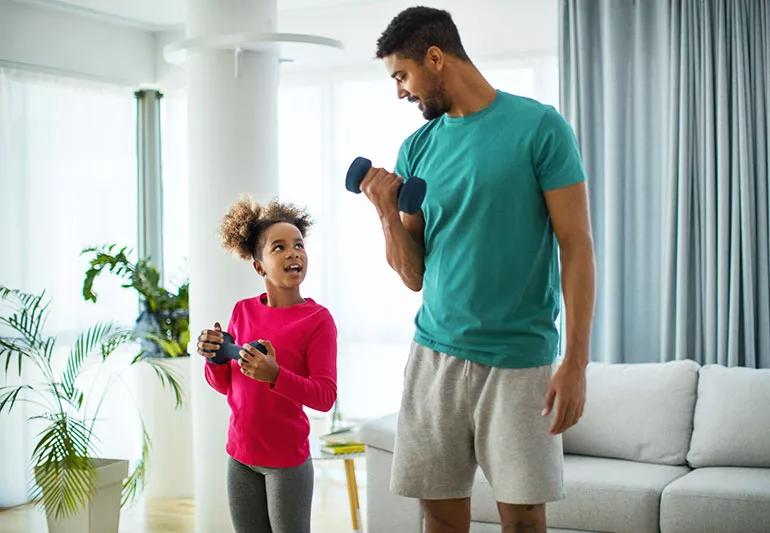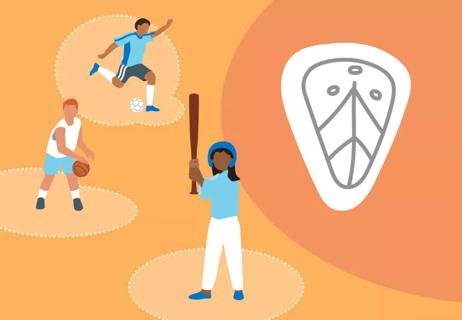Advertisement
Takeaways from sports psychology

The COVID-19 pandemic has upended the sports world — and for young athletes who are missing their beloved sport, it can be an especially challenging time.
Advertisement
Cleveland Clinic is a non-profit academic medical center. Advertising on our site helps support our mission. We do not endorse non-Cleveland Clinic products or services. Policy
We asked health and sports performance psychologist Matthew Sacco, PhD, what young athletes are dealing with during the pandemic and how to help them cope.
A: There are many different reactions, as you could imagine. When things shut down rapidly in March and spring sports were canceled, many young athletes experienced powerful grief. There was a lot of anger and resentment. It was especially challenging for high school and college seniors who were in their last year of eligibility for their sport.
Since then, it’s been like a yo-yo. There’s been so much anticipation: Will we be in school or not? Will the season be canceled or not? What makes it worse is how the rules seem arbitrary and ambiguous, varying from school to school. That uncertainty can be challenging — especially for young athletes who are used to operating on a pretty rigid schedule. Athletes have no control over this, and that has created a lot of anxiety.
A: Athlete identity is such a big piece of this puzzle. We identify with things that are important to us, and athletes have so much invested in their sport. If they’re not a basketball player or soccer player or swimmer right now, who are they?
There’s also a loss associated with the socialization that comes with being with your team. Athletes spend so much time with their teammates. Now they might not have any practice or competitions together, and when they do see each other, they can’t even high-five.
Advertisement
A: One of the most important things is to figure out what their day-to-day routine will look like. There are these big gaps now where their sport used to be. Kids and teens should try to create a consistent routine that includes the exercise they would have gotten during the season. Exercise is a really important outlet.
It helps to stay connected with others, too. A recent study looked at the well-being of student athletes before and after COVID-19 physical distancing started. The student athletes who reported feeling supported by and connected to teammates during the lockdown were less likely to feel the loss of their athletic identity. They also reported better mental health and well-being.
A: For younger kids, it’s likely a little easier. If an 8-year-old misses her soccer season, she’ll have plenty of time to make up for it in the future. Where you can find those easy wins, take them. For older kids and adolescents, these are often much more difficult decisions. I suggest starting with a list of pros and cons. From there, talk about what they’re afraid of and worried about.
While mental health concerns are real, so are physical health concerns. Some families may have medically vulnerable family members to consider. Younger people with COVID-19 are more likely to have mild cases. But there are reports of heart problems and other long-term issues that can affect health and athletic performance. Consider talking to your doctor about the risks as you weigh the pros and cons. It’s rarely an easy discussion — and unfortunately, there is no right answer. Every family has their own variables, and it’s uniquely personal.
A: As a parent, you can try to find other ways to provide enrichment. Try to do things with your kids that you haven’t been able to do because they’ve been so busy. Go for a run together, or learn some new games. Include your kids in more activities around the house to provide that sense of routine and structure.
Unfortunately, this isn’t about problem solving — we don’t have a solution for this. We would love for there to be a more simple and right way to make difficult decisions that we face right now. We don’t have anything close to this. Empathy is the most important thing right now. You can’t understand exactly what your child is going through, so don’t say, “I understand.” To a kid or a teenager, that sounds insulting. Acknowledge that they’re having a hard time and give them space to struggle (within reason).
You know your child, and if you have any concerns about their sadness or anxiety, look into professional help.
A: It’s always OK to ask for help. If you’re even the least bit concerned, start by talking to your primary care provider.
Now that so many things have gone virtual, it’s easier than ever to access and talk to a mental health professional, and I encourage people to take that step. For young athletes who are reluctant, they may be more open to the idea of talking with a sports psychologist. The most important thing is that they have access to a licensed mental health professional.
Advertisement
We’re all feeling the weight of the pandemic, and we don’t have a game plan for this. But it won’t last forever. Hopefully, we’ll come out on the other side having learned something about our priorities, within our families and as a society.
Advertisement
Learn more about our editorial process.
Advertisement

Protective equipment like sports cups can help avoid injury

Tiny taste-testing is a way babies can explore their world, relieve aching gums and self-soothe

Swimming is an essential life skill — kids should start learning to swim by age 4

The five phases of loss are denial, bargaining, anger, depression and acceptance — but they don’t always happen in that order

Slight increases are somewhat common from either the medication or changed habits

Look for signs like withdrawing from social eating and not gaining weight — and get treatment early if possible

Too much time in certain infant ‘containers’ can cause developmental delays and a flat spot on baby’s head

Eating disorders are diagnosable mental health conditions, while disordered eating is unhealthy eating behavior that doesn’t meet the criteria for a diagnosis

If you’re feeling short of breath, sleep can be tough — propping yourself up or sleeping on your side may help

If you fear the unknown or find yourself needing reassurance often, you may identify with this attachment style

If you’re looking to boost your gut health, it’s better to get fiber from whole foods